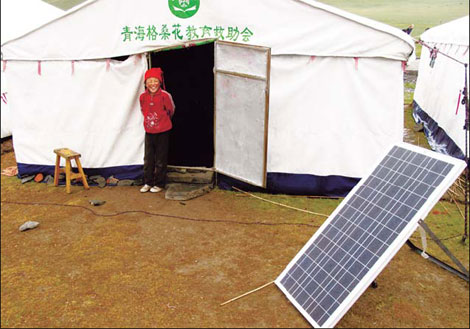Society
The future looks solar bright for herders' kids
Updated: 2011-09-13 07:46
By Erik Nilsson (China Daily)
|
A solar panel in front of one of the seven tents that serve as "dorms" of the elementary school. |
While Yege's children are the township's first generation who can read, they would effectively become illiterate after dusk.
That's because there was no electricity - hence, no light - in the seven tents that 78 of the primary school's 137 children call their "dorms".
But that changed in early August when the grassroots nonprofit Solidarity to End Poverty - United for Progress (Step Up) installed two high-voltage solar panels to launch its Brighter Future project. The electricity has transformed education in this Tibetan community of 2,000 nomadic yak herders in Qinghai province's Yushu prefecture.
"The solar panels have given our children new eyes," the school's deputy headmaster Yongdingquepab says.
The 5,000 yuan ($783) panels provided by Step Up, a branch of Low-Income Visionary Education, enable the children to study after dusk, watch TV and learn how to use computers.
"Before, they had no way of knowing anything about the outside world that isn't in their textbooks," Yongdingquepab says.
Neither did their instructors, English teacher Tseringbum adds.
"We couldn't teach the children about the world, because we had no way to know about it ourselves," he says.
The solar panels make it possible for the children to use teachers' laptops, Tseringbum says. "They really want to learn how to use computers," he says.
The electricity also helps student retention, chief of Yege's Hongqi village Kangia says.
"Without power, the school was like a prison," he says. "So parents didn't want to send their kids. They thought it was more important for them to herd yaks than to study."
Having electric lights also saves the children's eyesight from the damage caused by straining to read and write by candlelight, he says.
The teachers asked Step Up to install the panels in the tents rather than the school - which doesn't have electricity - because they can see by the sunlight that streams through the windows during their daytime classes.
The children cheered when the lights turned on for the first time.
Yege, where only 20 of the more than 400 households have electricity, is just one among the settlements in Qinghai that are too remote to connect to the fossil-fuel power grid.
The province on the frosty Tibetan Plateau is home to many of China's households without electricity - 8.5 million as of 2006, according to the International Energy Agency.
The lack of electricity is a factor in Qinghai's 10.2-percent illiteracy rate - the country's highest after the Tibet autonomous region, according to the 2010 census.
"Solar power is key to literacy," US Department of Energy staff scientist Evan Mills contends.
The World Bank reports Qinghai's herders are the most likely to lack electricity and education. More than half of the heads of nomadic households surveyed by the bank can't read and have never attended school.
But two-thirds of those with solar panels can read, the study says.
And the ray of hope solar offers off-grid communities is particularly bright in Qinghai. The province, which is slightly larger than France, receives 3,000 hours of sunshine a year, the most in the country after Tibet.
Qinghai has 12,500 megawatts of power generation capacity, and 2,000 mW of power is expected to come from solar farms by 2015, the provincial government says.
The province will spend 4.1 billion yuan to increase the current 56 mW of solar capacity to 300 mW by the end of September, after 13 solar projects are approved. And the total capacity will become 460 mW if five new projects, totaling 9.2 billion yuan, are authorized.
Solar is a "far cheaper" option than connecting to the fossil-fuel grid in isolated settlements like Yege, Mills says. "It avoids huge infrastructure and fuel costs."
"The payback can be under a year, depending on local fuel prices. The economics of solar get better as the sites become more remote and grid-extension costs rise."
And it makes sense for geologically hazardous locations, such as Yushu, where a 7.1-magnitude earthquake killed 2,000 last year and ruptured the walls of Yege's school.
"Solar can be more reliable than central grids," Mills says. "(It's) more resilient following natural disasters that damage central power systems and the grids."
And the environmental benefits are especially important in such ecologically sensitive areas as Yushu, the source of the "Three Rivers" - the Yellow, Yangtze and Lancang (Mekong).
"Off-grid solar power can improve indoor air quality and reduce the tension on local ecological systems and biomass resources," the United Nations Development Program China's country director Napoleon Navarro says.
But it's a matter of "will", China Solar & Clean Energy Solutions Inc's international director Patrick Sullivan explains.
"Solar electricity will need a large commitment," he says. "It is a great time for the government to look after the rural communities as they have promised."
In the meantime, NGOs like Step Up are illuminating hope by using solar to power education in places like Yege.
E-paper

Way over the moon
High inflation rockets mooncake prices out of orbit for mid-autumn festival
From death matches to child's play
Tomb raiders remain a menace
Kicking for joy
Specials

Singing success
Western musicians bring much-needed impetus to live performance industry

Salary bonanza for bosses
Top boss gets 8.78 million euros a year, far more than the State enterprise CEO with highest pay

Kicking for joy
Swedish college student represents China in Taekwondo championships

